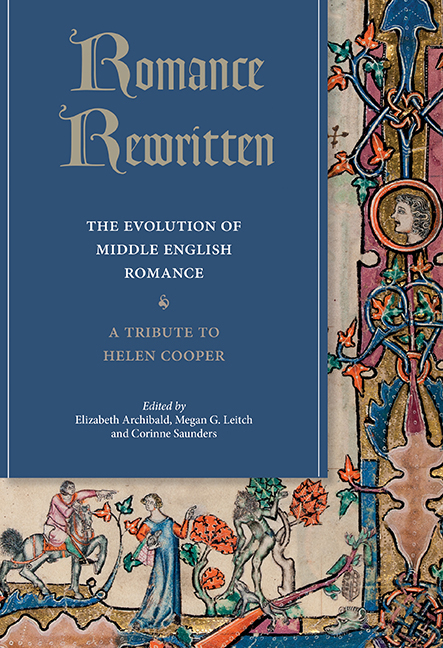Book contents
- Frontmatter
- Dedication
- Contents
- Notes on Contributors
- Acknowledgements
- Introduction. Middle English Romance: The Motifs and the Critics
- I Romance Disruptions
- II Romance and Narrative Strategies
- 4 Beginning with the Ending: Narrative Techniques and their Significance in Chaucer's Knight's Tale
- 5 The Riddle of ‘Apollonius’: ‘A Bok for King Richardes Sake’
- 6 Malory and the Post-Vulgate Cycle
- 7 Towards a Gestural Lexicon of Medieval English Romance
- III Romance and Spiritual Priorities
- IV Late Romance
- Works Cited
- Index
- Volumes Already Published
5 - The Riddle of ‘Apollonius’: ‘A Bok for King Richardes Sake’
from II - Romance and Narrative Strategies
Published online by Cambridge University Press: 17 October 2019
- Frontmatter
- Dedication
- Contents
- Notes on Contributors
- Acknowledgements
- Introduction. Middle English Romance: The Motifs and the Critics
- I Romance Disruptions
- II Romance and Narrative Strategies
- 4 Beginning with the Ending: Narrative Techniques and their Significance in Chaucer's Knight's Tale
- 5 The Riddle of ‘Apollonius’: ‘A Bok for King Richardes Sake’
- 6 Malory and the Post-Vulgate Cycle
- 7 Towards a Gestural Lexicon of Medieval English Romance
- III Romance and Spiritual Priorities
- IV Late Romance
- Works Cited
- Index
- Volumes Already Published
Summary
The ‘Tale of Apollonius’ stands out from John Gower's Confessio Amantis for several reasons. It is the longest of the many illustrative stories offered by the Confessor, Genius, to the hapless lover, Amans, during the latter's extended confession. As the last tale told, it unavoidably raises expectations that it should function as a summa of the poem's first seven Books – in which capacity it does not disappoint. The ‘Tale of Apollonius’ is also one of Gower's very few forays into the romance genre. As Corinne Saunders has rightly reminded us, however, applying such terminology requires caution. ‘Texts now classified as “romances” were not necessarily identified as such when written’, she points out, ‘but came to be seen retrospectively as exemplifying a set of genre characteristics that existed before and extended beyond the Middle Ages.’ It is an important caveat. Whether Gower, if asked, would have named ‘Apollonius’ a romance in any modern sense is beyond our determination. Fortunately it is also somewhat beside the point.
Gower's initial answer, indeed, might have been a denial. The (infrequent) references to romances identifiable in his works suggest that, for Gower, a ‘romanz’ narrative would have been chivalric. His known sources for the ‘Tale of Apollonius’ are histories and exemplum collections: the Historia Apollonii regis Tyri, Secretum Secretorum, Godfrey of Viterbo's Pantheon, and the Gesta Romanorum. Although the Historia Apollonii has ancient roots and is often discussed alongside the so-called ‘Greek romances’, there is no reason to believe that Gower would not have taken its title at face-value and considered it primarily a historical work. Very likely he held Godfrey's book in a similar light, too. Intended to contain every form of knowledge, the Pantheon was encyclopedic in scope, and a frequent source of information for Gower. So were the Secretum and the Gesta Romanorum: from those compendia Gower borrowed some of the Confessio's most memorable narratives, in the latter case apparently taking the title – ‘Deeds of the Romans’ – more or less literally, and its contents as closer to factual history.
Such sources suggest that Gower's motivation to conclude the instructive portion of Amans's shrift with the ‘Tale of Apollonius’ may have been more complex than is often thought. Certainly for many, beginning with at least G. C. Macaulay, the unfolding of Confessio Book VIII has raised troublesome questions.
- Type
- Chapter
- Information
- Romance RewrittenThe Evolution of Middle English Romance. A Tribute to Helen Cooper, pp. 103 - 114Publisher: Boydell & BrewerPrint publication year: 2018



